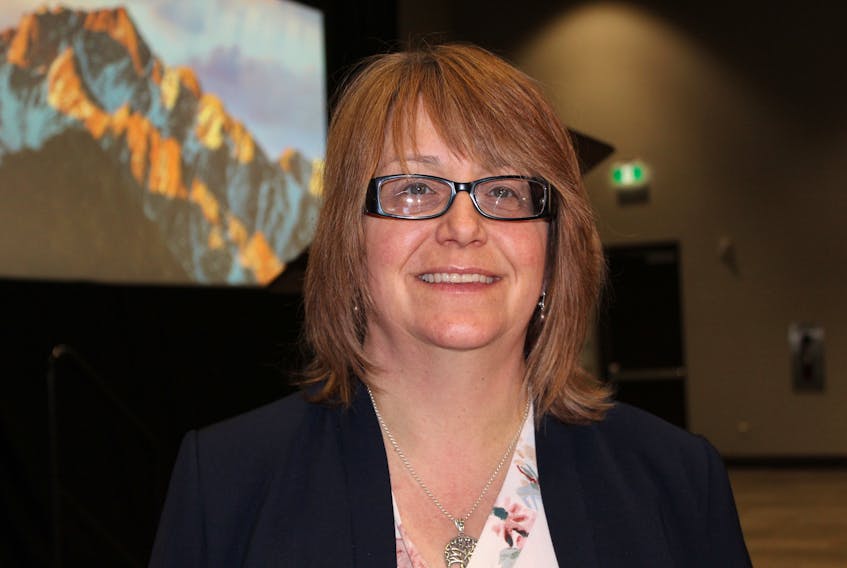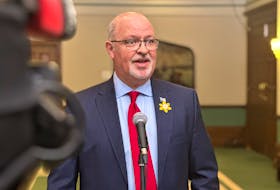ST. JOHN'S, N.L. — With the rapid growth of digital health and artificial intelligence in the health sector, the Newfoundland and Labrador Medical Association (NLMA) has announced a virtual care strategy.
It’s been in the works since last September. After months of surveys and focus groups involving stakeholders ranging from patient advocacy groups to government officials, the strategy was developed and announced at the NLMA Virtual Care Summit on Saturday at the St. John’s Convention Centre.
Past president Dr. Tracey Bridger – new president Dr. Charlene Fitzgerald took over the role later Saturday evening – told The Telegram the overall purpose of the strategy is to influence the expansion of virtual care services in the province.
“A lot of the big companies like Google, Apple, (and) Amazon are spending billions of dollars on health – on digital health – and they are going to be pushing forward. There’s private virtual care here now that people actually can access and pay for, so it’s happening whether or not we get involved,” she said.
“If we don’t do it and have our say in how it’s going to roll out and be leaders in it, you know, things are going to be done that probably aren’t for the best interest of the patient.”
“If we don’t do it and have our say in how it’s going to roll out and be leaders in it, you know, things are going to be done that probably aren’t for the best interest of the patient.” — Dr. Tracey Bridger
Virtual care is any interaction with a patient that occurs remotely. It can involve the use of health technology, mobile devices, artificial intelligence and augmented reality.
In a speech to conference delegates, Bridger said some of this province’s challenges actually position it to become a leader in adopting virtual care.
Some of those challenges include a large rural population, the highest incidence of chronic disease in the country, and Canada’s fastest aging population. There are also 65,000 people in the province without a family doctor.
Bridger said that by 2023 there’s expected to be a reduction in emergency department visits across North America because chronically ill patients will be availing of virtual care enhanced with artificial intelligence (AI).
Asked whether she’s concerned that AI might begin replacing physicians, Bridger said she believes AI is “just going to enhance” care.
“We’ll have perhaps even a deeper understanding of (patients’) own lives in their home, more data in terms of health data that they have and that we can share with them, and it will give us more time to do the things that we want to do in terms of talking to the patient and helping in those ways.
“Some things might change slightly for sure, and AI will have a role in helping us with that, but I don’t think physicians are ever going to be overtaken completely by—” she laughed, “by a robot.”
In her speech, Bridger spoke about how patients expect health services to move at the same pace as other industries that are now well-established online, such as banking, hospitality, and entertainment.
She told The Telegram virtual health is “going to become critical” in the province.
"I don’t think physicians are ever going to be overtaken completely... by a robot.” — Bridger
On Saturday, panelists at the summit spoke about many benefits of virtual care – for example, people in remote parts of the province can access specialists without having to travel long distances to larger centres.
One panelist was Lindee David, CEO of Joule, a Canadian Medical Association subsidiary that supports physician-led innovation and adoption of technological advances. She asked the summit attendees “one day, wouldn’t it be great if we didn’t talk about digital health?”
David said digital is just a channel.
“It’s about health, and how we care for people.”
Panelists also spoke about concerns, such as patient privacy when using apps, and the need for such technologies to be vetted for security and other concerns before they’re widely used by doctors.
Still, some level of virtual care, such as telehealth, is already happening in the province, and its implementation in health care continues to grow.
Last year there were just over 20,000 telehealth visits in the province, and many more examples of physicians communicating with patients via email.
“But that’s just the tip of the iceberg of what can be done,” said Bridger.
Twitter: @juanitamercer_
MORE FROM JUANITA MERCER









